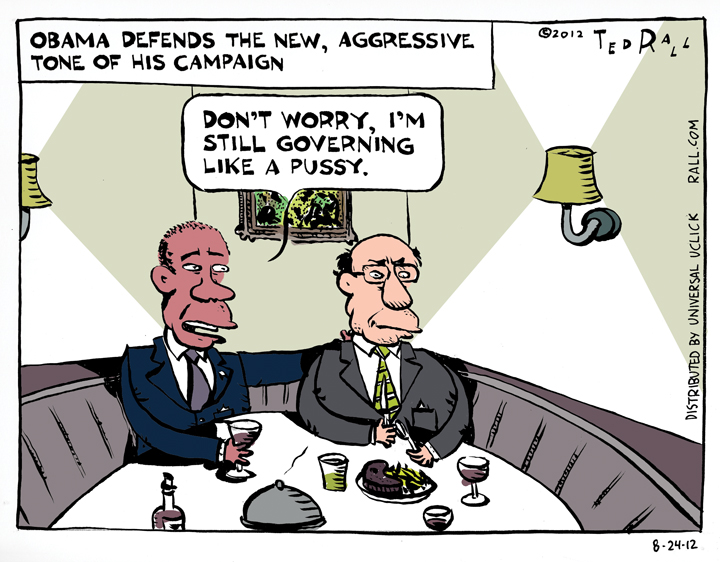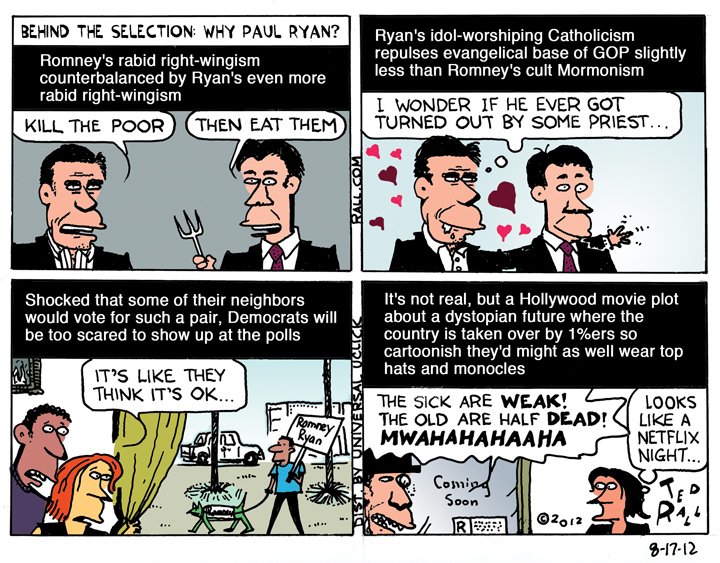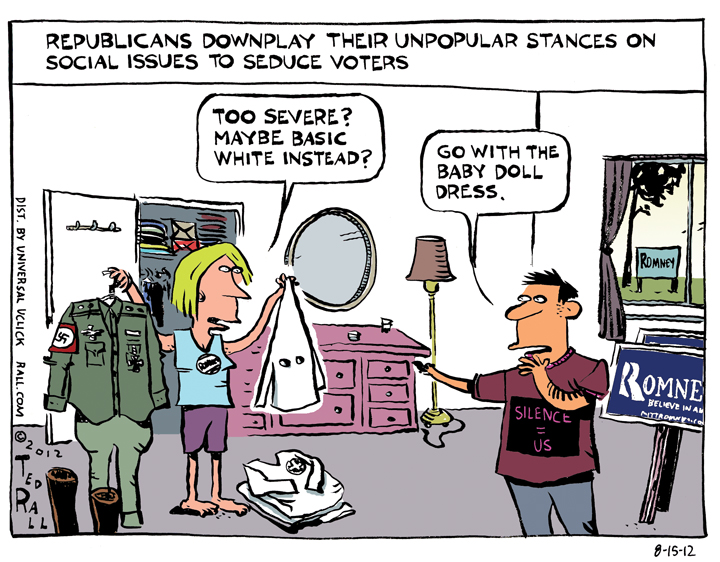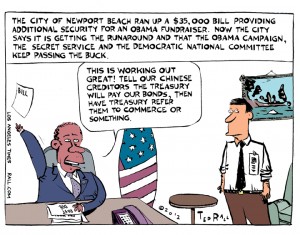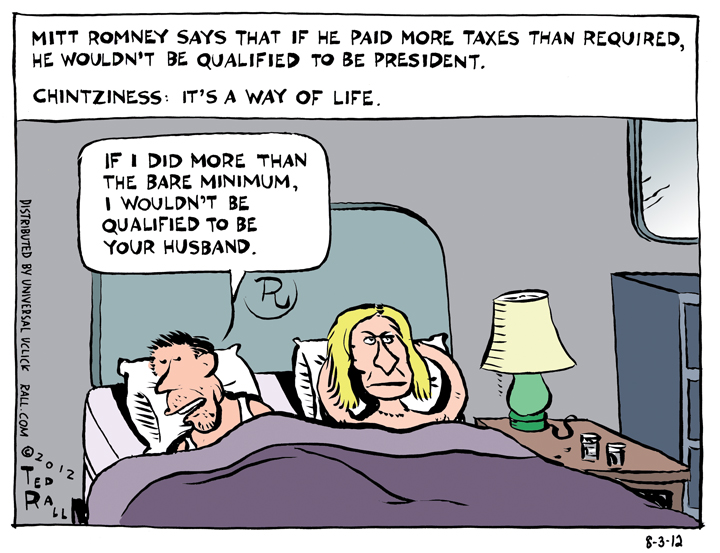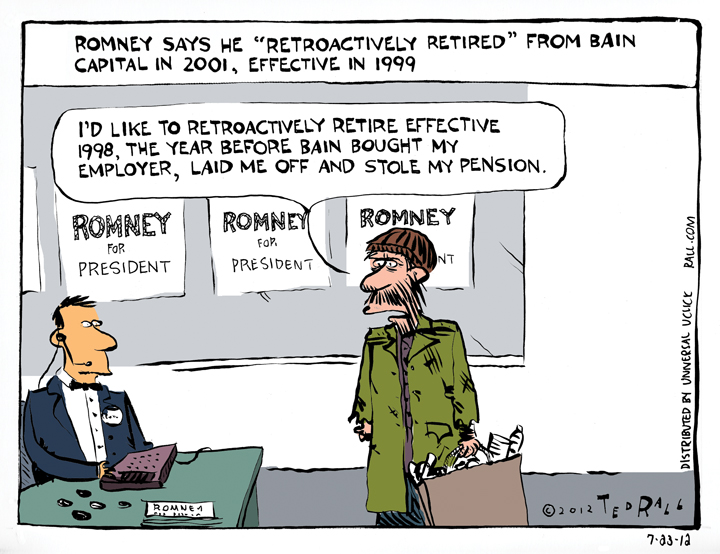President Obama defends the new, aggressive tone of his campaign, which in no way, shape or form reflects any substantive change in his suck-uppery to corporate interests.
SYNDICATED COLUMN: Fear of a Right Planet
Romney-Ryan Extremism Could Revive Liberal Support for Obama
Soviet citizens had to be Kremlinologists, studying subtle linguistic and tonal shifts in state propaganda, noting the seating order of party leaders at official functions, in order to predict the future direction of their lives. So too are we Americans, for without any way to really get to know our politicians—their press conferences and interviews are too infrequent and carefully stagemanaged, unchallenged by compliant journalistic toadies—we are reduced to reading signals.
Even to an alienated electorate, the tealeaves are easy to read on the Republican side.
Between Romney’s selection of Paul Ryan as his running mate, his team of Dubya-rehash economic advisors (because that worked out so well) and Tea Party favorite Chris Christie as keynote speaker at this year’s Republican National Convention, the Republican Party is in danger of doing something that seemed impossible just a few months ago: strengthening support among the liberal base of the Democratic Party for President Obama.
Granted, disappointed lefties will not soon forget Obama’s betrayals. Guantánamo, the concentration camp that supposedly holds “the worst of the worst” terrorists, remains open—although, now that the White House is reportedly negotiating with the Taliban to exchange captured Afghan ministers for an American POW, one assumes they’re not all that bad. The drone wars against Afghanistan, Pakistan, Yemen and elsewhere are an affront to basic morality, logic and decency. On the economy, this tone-deaf president has yet to propose a jobs program, much less try to push one through Congress.
But many progressives, until recently threatening to sit on their hands or cast votes for a third party, are reconsidering, weighing disgust against gathering terror as they read the signals from the gathering storm in Tampa. Where Obama fails to inspire enthusiasm, the Romney team seems determined to generate as much fear as possible that he plans to shove the needle even further to the radical right than Reagan or Bush.
Romney, who abandoned his history as a centrist Massachusetts Republican and is running as a right-winger, chose to balance his newfound extremism with Paul Ryan, an even-more-right-winger. Ryan is a vicious, overrated ideologue whose greatest achievement, his theoretical budget proposal, paints a picture of America as a dystopian hell where an infinitely funded Pentagon wages perpetual war and the top 1% of the top 1% party on tax cuts while the elderly and poor starve or succumb to treatable diseases, whichever kills them first. (In the media today, this gets you lionized as “smart,” “wonky,” and “an intellectual heavyweight.” Ryan = Sartre.) Lest you wonder whether the Ryan selection is an anomaly, wonder not—from Christie to the stump speeches to the men first in line to join a Romney cabinet, everything about Team Romney screams Tea Party, Rush Limbaugh, Ann Coulter, Ayn Rand minus the cool atheism and elitism.
This is a Republican Party that Barry Goldwater wouldn’t recognize, batso nutso, stripped of the last veneer of libertarianism, completely owned by and in thrall to figures whom the media would characterize as “extreme nationalist” or “neo-Nazi” if they spouted the same nonsense in other countries.
If I were advising Romney, I would tell him that cozying up to the lunatic fringe of American pseudoconservatism is not a prescription for victory in November, when the outcome hinges upon seducing that 5% or 10% of voters who swing both ways. Ryan isn’t as crazy (or bold) of a choice as Sarah Palin, but what Republicans don’t understand is that conservatives will vote Republican regardless of who is the vice presidential running mate or, for that matter, who is the Republican nominee for president. Lack of enthusiasm among the base wasn’t Romney’s big problem, it was Obama’s.
Romney’s biggest albatross is that he’s a terrible candidate, a guy who obviously doesn’t like people. And his campaign sucks. The deficit may or may not represent an looming existential threat—unemployment and the environment are more urgent—but “take your medicine” austerity isn’t much of a sales pitch, especially when two-thirds of the people are already feeling squeezed. Voters reward candidates who present an optimistic vision, a future in which they see themselves richer, happier and with fuller, more lustrous hair.
The fact that Romney can’t manage to put forward a credible economic program doesn’t help either. Since his entire campaign is predicated on the argument that he’s the economy guy and knows how to fix it, he needs to cough up a plan.
However, my real concern is that Romney’s gangbusters right-wing extremism lets Obama and the Democrats off the hook.
If all Democratic strategists have to do to attract progressive voters is to frighten them with greater-evil Republicans, when will people who care about the working class, who oppose wars of choice, and whose critique of government is that it isn’t in our lives enough ever see their dreams become party platform planks with some chance of being incorporated into legislation? In recent elections (c.f. Sarah Palin and some old guy versus Barry), liberals are only voting for Democrats out of terror that things will get even worse. That’s no way to run a party, or a country.
(Ted Rall’s new book is “The Book of Obama: How We Went From Hope and Change to the Age of Revolt.” His website is tedrall.com. This column originally appeared at NBCNews.com’s Lean Forward blog.)
COPYRIGHT 2012 TED RALL
SYNDICATED COLUMN: Iran – Because Two Wars Aren’t Enough
Why Doesn’t Anyone Call Out Romney for Warmongering?
Mitt Romney had a barnburner of a weekend in Israel. The GOP nominee apparent shared his unique combination of economic and anthropological wisdom, attributing the fact that Israel’s GDP and average income is many times higher than those of the Palestinian Occupied Territories to Israelis’ superior “culture.”
As if spewing one of the most overtly racist lines in recent presidential campaign history wasn’t enough, eschewing “containment” (read: “diplomacy”), Romney also endorsed a preemptive Israeli military strike against Iran in order to prevent the latter’s nuclear program—Israel’s own, illegal nuclear weapons stockpile is OK since it’s a U.S. ally—from moving forward.
“We have a solemn duty and a moral imperative to deny Iran’s leaders the means to follow through on their malevolent intentions,” Romney said, stating that “no option should be excluded.”
He didn’t say how he knew the intentions of Iran’s leaders. Clairvoyance? Bush had it too.
Though Mitt slightly walked back his campaign’s sabre rattling, the message was clear. If he is elected, Israel will receive a blank check to begin a war against Iran, one of the most well-equipped military powers in the Middle East—a conflagration in which the United States could easily wind up getting dragged into. (In a subsequent interview he reiterated that “we have all options on the table. Those include military options.”)
Most criticism focused on Romney’s flouting of the traditional proscription against candidates questioning a sitting president’s foreign policy while visiting foreign soil. Though, to be fair, the differences between his and President Obama’s approach to Israel and Iran are tonal and minor.
As usual with the U.S. media, what is remarkable is what is going unsaid. Here we are, with the economy in shambles and the public worried sick about it, the electorate tired of 12 years of war against Afghanistan and nine against Iraq, yet Romney—who could be president six months from now—is out ramping up tensions and increasing the odds of a brand-new, bigger-than-ever military misadventure.
Warmongering has gone mainstream. It’s a given.
In a way, Romney’s willingness to risk war against Iran is merely another example, like the car garage and dressage, of how clueless and out of touch he is. Most Americans oppose war with Iran. For that matter, so do the citizens of the country on whose behalf we’d be killing and dying, Israel. But even Romney’s Democratic opponents give him a pass for Romney’s tough-guy act on Iran.
The reason for the somnolent non-response is obvious: it’s nothing new. Year after year, on one foreign crisis after another, American presidents repeatedly state some variation on the theme that war is always an option, that the military option is always on the table. You’ve heard that line so often that you take it for granted.
But did you know that “keeping the military option on the table” is a serious violation of international law?
The United States is an original signatory of the United Nations Charter, which has the full force of U.S. law since it was ratified by the Senate in 1945. Article 51 allows military force only in self-defense, in response to an “armed attack.” As Yale law and political science professor Bruce Ackerman wrote in The Los Angeles Times in March, international law generally allows preemptive strikes only in the case of “imminent threat.” In 1842 Secretary of State Daniel Webster wrote what remains the standard definition of “imminent,” which is that the threat must be “instant, overwhelming, leaving no choice of means and no moment for deliberation.” The enemy’s troops have massed on your border. They have superior force. What must be done to stop them is evident. There’s no time for diplomacy.
Iran’s nuclear program doesn’t come close to this definition, even from Israel’s standpoint. Bruce Fein, deputy attorney general under Reagan, told Fairness and Accuracy in Reporting’s Extra! Magazine: “It is nothing short of bizarre to claim, as the Obama Administration is doing, that the mere capability to make a bomb is justification for a preemptive attack. That’s a recipe for perpetual war. Almost any country could have the capability to make a bomb. They are torturing the word ‘imminent’ to the point that it has no meaning.”
By endorsing an Israeli attack against Iran at a time when there is no proof that Iran has nuclear weapons, intends to develop them, or use them if it does, Romney is going farther than Obama, who has engaged in back-channel diplomacy.
The Allies’ main brief against the Nazi leaders tried at Nuremberg was not genocide, but that they had violated international law by waging aggressive war. Yet every American president has deployed troops in aggressive military actions.
Aggressive war hasn’t been good for America’s international image, the environment, our economy or the millions who have died, mostly for causes that are now forgotten or regretted. But unless we draw the line against reckless, irresponsible rhetoric like Romney’s, it will go on forever.
(Ted Rall’s new book is “The Book of Obama: How We Went From Hope and Change to the Age of Revolt.” His website is tedrall.com. This column originally appeared at NBCNews.com)
(C) 2012 TED RALL, ALL RIGHTS RESERVED.
LOS ANGELES TIMES CARTOON: A California Town Gets The Runaround
I draw cartoons for The Los Angeles Times about issues related to California and the Southland (metro Los Angeles).
I draw cartoons for The Los Angeles Times about issues related to California and the Southland (metro Los Angeles).
This week: The city of Newport Beach ran up a $35,000 bill providing additional security for an Obama fundraiser. Now the city says it is getting the runaround and that the Obama campaign, the U.S. Secret Service, and the Democratic National Committee keep passing the buck.
SYNDICATED COLUMN: Why We’re Apathetic
Obama and Romney Ignore the #1 Issue
Don’t be apathetic, they tell us. If you don’t vote, you can’t complain. But how can people get excited about a political campaign that doesn’t address the issues we care about most?
Polls show that Americans are more concerned about the economy than any other issue. That has been the case since Obama became president in 2009.
Ignoring the elephant in the room, neither Obama nor Romney have put forth credible plans for getting the unemployed back to work or getting raises for those who still have jobs—and forget about underemployment. (In the long run, America’s biggest jobs problem isn’t that workers don’t have enough skills, but that millions are working beneath their level of intelligence and educational attainment.)
Obama says he inherited a mess. He’s right. His supporters say climbing out of the hole created by the 2008 meltdown and Bush’s deficit spending will take time. Which is true. But Obama never proposed a jobs program—so he can’t claim that Republican Congressional meanies blocked him.
Bizarrely, the President doesn’t explicitly promise that the economy will get better if we reelect him. His reelection campaign is mostly backwards looking, pointing to his achievements so far: healthcare, pulling out of Iraq, the assassination of Osama bin Laden, and his unpopular bailout of the big banks. On the economy, his overall approach has been to counsel patience, while hoping for things to improve.
Say this for Mitt Romney: he doesn’t share the president’s reticence. “If I become president, you’re going to see an economic resurgence: manufacturing resurgence, high-tech, health care. You’re going to see this economy take off,” Romney told supporters in New Jersey last month. “And I say that because I know what I’m going to do, and I know what kind of impact it will have.”
Romney’s ads strike the same can-do tone. “By day 100, President Romney’s leadership brings new certainty to our economy, and the promise of new banking and high-tech jobs.”
Whoa.
How will this kickass FDR-like miracle transpire? Romney has put forth what John Cassidy of The New Yorker calls a “ragtag collection of proposals—59 of them, ranging from eliminating the inheritance tax, to capping federal spending at twenty per cent of GDP, to opening up America’s energy reserves for development [which have been] widely dismissed as inadequate by his fellow Republicans.”
Trickle-down redux. Warmed-over drill-baby-drill
Sarahcuda. A dash of Steve Forbes (remember him?). In short: not so whoa.
If I were Romney I’d be proposing a conservative-based jobs-growth agenda—i.e., one that puts money into the pockets of business. Tax incentives for employers to hire new workers. Federal subsidies for job training programs. Higher payroll deductions for corporations. Capital gains tax cuts conditioned on funds being invested into projects that generate new jobs.
Romney could shore up his party’s nativist base by promising to build an impenetrable fence along the border with Mexico and to crack down on undocumented workers.
Thanks to the Republican Congress, it would be easy for Obama to make the case to voters that he’s trying to create jobs. He could propose something bold and grand, a new WPA that directly employs 20 million Americans building high-speed rail lines, new bridges and tunnels, teachers, artists, you name it. Best of all, it’s a promise he wouldn’t have to keep. The GOP would block it—turning them into the obstructionists Democrats portray them as.
Obama could also pursue small-bore approaches to the jobs problem, such a “first fired, first rehired” law that requires large employers to offer new jobs to their first layoff victims. The United States should join European countries, which don’t set arbitrary time limits on unemployment benefits. Layoff victims shouldn’t lose their homes; a federal program should cover their rent or mortgage payments until they get back on their feet.
Would these ideas fix the economy? Maybe not. But they would certainly go a long way toward reversing the current toxic state of electoral politics, in which the major parties float irrelevant wedge issues in their perennial battle over two or three percent of the vote in a handful of swing states, by engaging citizens in the process.
Will either party push forward a credible solution to the economic crisis? Probably not. Which is a reflection of the system’s inability to reform itself, and a harbinger of revolutionary change to come.
(Ted Rall’s new book is “The Book of Obama: How We Went From Hope and Change to the Age of Revolt.” His website is tedrall.com. This column originally appeared at NBCNews.com)
(C) 2012 TED RALL, ALL RIGHTS RESERVED.

